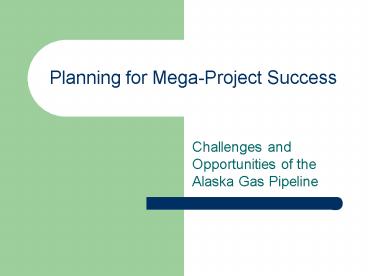Planning for MegaProject Success - PowerPoint PPT Presentation
1 / 19
Title:
Planning for MegaProject Success
Description:
Most seismically active zone in North America ... Native lifestyles. Transportation, other human land uses. 800 mile trench across Alaska ... – PowerPoint PPT presentation
Number of Views:42
Avg rating:3.0/5.0
Title: Planning for MegaProject Success
1
Planning for Mega-Project Success
- Challenges and Opportunities of the Alaska Gas
Pipeline
2
Development of Alaska Natural Gas40 years and
counting
- 1960s Discovery of North Slope Oil
- 30 trillion cubic feet of natural gas
- 1970s Canada-US Treaty, Presidential Selection
- 1980s De-regulation of US natural gas, pre-build
of gas lines from Canada to US - 1990s Canada movement toward a market approach
depletion of giant fields supply and price
concerns - 2000s Serious efforts toward project approval
by North Slope producers
3
The Project
- 4000 mile high-pressure buried natural gas
pipeline from Arctic Ocean at Prudhoe Bay, Alaska
to Chicago, Illinois - Worlds largest natural gas treatment plant,
bordering the Arctic Ocean - Potential intermediate Natural Gas Liquids plant
in Canada or US
4
The Gas
- Prudhoe Bay, Point Thomson, other fields leased
by BP, ExxonMobil, ConocoPhillips - Oil produced at Prudhoe, produced gas is
re-injected - Point Thomson not yet on-line
- Total gas 30 trillion cu ft
- Around 6 of US annual demand, 30 years
5
US Demand for Natural Gas
- Increasing year by year
- Clean Air Act, electric power plants
- Combined cycle plants
- Less seasonally driven
- Nationwide gas transmission lines, delivery
infrastructure - Often the preferred energy source
6
Supply
- Depletion of giant fields
- Disappointing conventional discoveries
- Barriers to entry
- Emergence of coal-bed methane
- Tight sands technologies
- LNG terminal projects
- Rising costs
7
Price per mcf
- Since 2000, 2.00 - 14.00 and higher
- 7.00 or so today
- Even at 7.00, projects being delayed or canceled
(high costs) - Just during 2001 Producer pipeline study, price
moved from 10.00 back down to 2.00
What will be the price between 2020 and 2050?
8
Fun with numbers (and people)
- 48-52 inch steel pipe, buried 4000 miles from
Arctic to Chicago, high pressure (2000-2500 psi) - Worlds largest natural gas treatment plant on
the Arctic Ocean - Hundreds of miles in permafrost
- Most seismically active zone in North America
- All pipeline steel produced for 2 years,
worldwide - 7 Alaska tribal regions, 15-25 First Nations,
State lands - 40 billion?
- 12 year project?
9
Environmental Challenge
- Salmon-spawning streams
- Animal migration
- Historic preservation
- Culturally-significant sites
- Native lifestyles
- Transportation, other human land uses
- 800 mile trench across Alaska
- Permafrost ? Breakup ? SOIL EROSION
10
Safety
- 50 million man-hours
- In harsh environment
- In winter
- In dark
- Along Alaska Highway
- High pressure pipeline
- Local hire and training mandates
11
Risks Barriers to Project Success
- Taxes and royalties
- Price of steel
- Price of labor
- Engineering challenges
- Stakeholder interests
- Political leadership
Stable business environment largely influenced by
governments
12
Project Planning 2001ff
- 150 people, 125 million
- Technical, environmental, land issues
- Costs and schedule
- 80 ready for FERC application
- Support of major Alaska Native communities and
significant support of First Nations - Right-of-way through State lands
- Draft fiscal agreement
13
Status
- State rejected fiscal agreement
- State doubled government take
- New State law set up process to pick one
preferred pipeline project and company - State picked TransCanada, promising 500 million
to plan, permit a project - BP and ConocoPhillips pursuing Denali Pipeline
project independent of TCPL - Viability of any project remains uncertain
14
Success or Failure?
- Producers spent millions
- State raised taxes
- Huge increases in costs
- State added barriers to success
- Project sanction legislation
- Point Thomson lease revocation
- Disappointed stakeholders
- Sunk costs, no returns
- Butwith all that
15
What if companies had proceeded in 2001?
- Unforeseen steel demand/price
- Unresolved First Nation issues
- Unanticipated market/supply issues
- Faster depletion of Prudhoe oil resource
- Even worse-case State tax and royalty regime?
- Financial system crisis
- Yes, but
16
The States action has been fatal
- Canada Good Will
- Large First Nation Support
- Native Alaskan Sanction
- Congressional Approval
The government with the most to gain has thus far
thrown up the greatest roadblocks
17
What next?
- While planning for this project, local political
opposition killed two other energy projects in
Maine and California, and many others - Despite the Supremacy Clause and Eminent Domain,
the Federal Government has no solution to state
and local stonewalling on energy project permits
and public/community landowner issues - While we focus on the price of gasoline, and
dream of alternative energy, we continue to
tolerate locally politicized barriers to
execution of even the most environmentally
friendly energy projects of the future
18
An essential consensusA new way to move forward
- We need a new focus on state and local barriers
to essential energy projects - The emphasis should be on things important to
national energy and economic security - It must be collaborative, not authoritarian
- It must recognize the needs of the entire
community, the nation as a whole, and our
obligations to each other, our global friends,
and future generations - Without significant changes, the promise of
developing the environmentally friendly energy of
the future and delivering it efficiently cannot
be achieved
19
What?
- (Surely not!)
A National Energy Policy?































